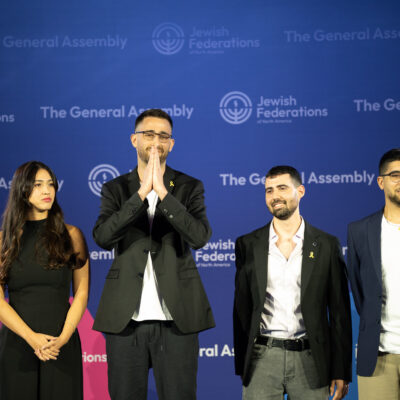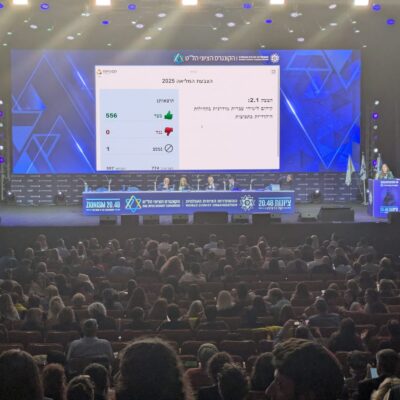MAKING CONNECTIONS
Ne’eman Foundation marks $100 million raised for Israeli causes, credits ‘personal touch’
Fundraising group serves as a go-between for American donors and Israeli nonprofits, including those based in the West Bank

GETTY IMAGES
Illustration. A person puts a penny into a 'tzedaka' box.
Over the past decade, the Ne’eman Foundation, a small West Bank-based nonprofit, has quietly facilitated the transfer of more than $100 million in charitable donations from donors in North America to organizations in Israel.
But rather than call it a “milestone,” foundation founder and CEO Chaim Katz told eJewishPhilanthropy that he prefers to look at it as an “important indicator” of the organization’s success and the trust donors have put into the foundation.
The foundation operates as a registered 501(c)3 organization, providing technical solutions for transferring donations from the U.S. to Israel while maintaining full compliance with American tax law and IRS requirements. (Until recently, the group did the same for donations from Canada, but its tax-exempt status was revoked last year over bookkeeping issues and donations to Israeli military-linked causes in contravention of Canadian tax laws, though Jewish leaders see it as part of a wider anti-Israel campaign against Zionist nonprofits.)
“We have a reputation that says we will help get money to where it wants to go. People trust us. If they didn’t trust us, they wouldn’t entrust us with their donations,” Katz said. The organization’s modest size, transparency and “personal touch” have become part of its reputation, he added. “We’re small. People have our mobile phone numbers. They can call us.”
Founded in 2001 by Katz, the foundation primarily acts as a go-between or “messenger” in bringing donations to Israeli charities, including those operating in West Bank settlements and those affiliated with the country’s political right. (The organization stresses that its mandate does not allow it to support explicitly political organizations.) It serves as a bridge between the two countries, processing donations while ensuring that the recipient organizations meet charitable criteria and are eligible to receive funds, he explained.
Katz, who made aliyah from Canada in 1987 and had years of experience in Jewish organizations, financial management and fundraising, said he established the foundation after recognizing the need for an “efficient and transparent” solution for transferring donations from North America.
Similar to PEF Israel Endowment Funds, Ne’eman Foundation works specifically with smaller Israeli nonprofits that do not have an “American friends of” affiliate or otherwise lack the resources to fundraise independently in the U.S., he added. Among the organizations the foundation assists are hospitals, educational institutions, organizations supporting children with special needs and community welfare nonprofits.
“We can bring to light what [the smaller organizations] are doing. Introduce a large number of people, to a lot of the smaller places that also are desperately in need of assistance,” he said.
As of today, the foundation has approximately 1,400 charities registered with it that use its services regularly, Katz said.
The major donors are typically American Jews with ties to Israel, some of whom divide their time between the two countries, according to Katz. “They want to donate quickly and efficiently, but also know that their money reaches the right place in accordance with the law, and that large percentages won’t be deducted from their donation amount for overhead costs,” he said.
In August 2024, the Canada Revenue Agency (CRA) revoked the Ne’eman Foundation of Canada’s charitable status after a multiyear audit found it violated the Canadian Income Tax Act, citing serious noncompliance with the Income Tax Act, including improper record-keeping and failure to dedicate resources to charitable activities, specifically its donations to Israeli military-related matters and settlement activities. In addition to the Ne’eman Foundation, the Canadian arm of the Jewish National Fund lost its tax-exempt status that same month. Jewish leaders have accused Canadian authorities of leading an ideologically motivated campaign against Israel-related nonprofits.
Central to the CRA’s concerns were the foundation’s financial ties to Israeli organizations operating in West Bank settlements — territories considered in violation of international law and Canadian public policy — and its connection to right-wing settler groups such as Elad/Ir David and Women in Green. Katz said the foundation adhered to Canadian tax laws, focusing on programs like vocational training for discharged soldiers. In its correspondences with Canadian tax authorities, the foundation also noted the centrality of the military in Israeli society and the significance of lone soldiers. Ultimately, the foundation opted to cease operations in Canada.
“It’s something far bigger than I am. It’s a political situation that I don’t care to delve into,” Katz told eJP.
“Our 501(c)3 states that we support charities throughout Israel, including Judea and Samaria. That was approved by the Internal Revenue Service,” added Katz, referring to the biblical term for the West Bank. “That doesn’t bother me. There’s always going to be somebody who’s going to have their nose bent out of shape somehow. We support charities north, south, east and west — whatever is legal. We probably turn away as many donations as those that we receive.”
The foundation does not have a mandate under U.S. tax law to donate to IDF combat units, he noted, though they do support programs such as vocational training and education for discharged soldiers.
“Politics do not enter our work at all. Our mandate, which is publicly available, states the charitable arenas that we do support. Anything that is controversial, anything that has political leanings, that’s not us,” he said. He noted that the partnership with Women in Green ended in 2019.
Before approving donations for specific charities, the foundation conducts due diligence to verify their eligibility for receiving support, said Katz.
He noted that the donations must follow a specific procedure for them to be tax-deductible through the foundation. To comply with U.S. tax law, donors can only recommend that their contribution go to a specific Israeli charity, then the foundation must perform its due diligence and determine if the proposed recipient meets the necessary charitable criteria. If so, the foundation’s board can decide to donate to that organization.
Sometimes following that initial due diligence, the foundation determined that it can’t support a specific organization, so it then circles back to the donor with alternatives, Katz said. There are also rare cases in which a donation is returned because the desired recipient fell outside the scope of what the foundation is permitted to support. The orgazniation is “conservative” in the way they operate, said Katz.
According to the foundation, its vetting process includes an initial phone call and a review of the organization’s documentation, including media, receipts and legal records. It can also include field visits as necessary. The recipients also must be registered nonprofits. Final approval is granted by the foundation’s governing board.
Operating with a five-person staff out of an office in the West Bank settlement of Shiloh, the foundation enables donors in the U.S., as well as Australia, to receive tax receipts for their contributions — a key reason why funds often come through them rather than going directly to Israeli organizations.
The Ne’eman Foundation operates on the philosophy that every donation counts, whether it’s $5 or $500,000, or even donated stocks and securities, which they accept, said Katz. He noted that the organization sends the same thank-you letter to all donors, reflecting his belief that the value of charity should not be judged by its monetary size.
This personalized, hands-on approach set the organization apart during the COVID-19 pandemic, he said, when many others closed their doors. Anticipating disruptions, Ne’eman moved significant funds from North America to Israel in advance of banking and postal shutdowns. They created a triage system to assess urgent needs and continued disbursing funds even as other institutions halted operations. The foundation’s ability to stay agile and responsive in crisis underscored its commitment to direct engagement and personal service in a philanthropic landscape that, Katz noted, has become increasingly impersonal.
Donations also grew in the aftermath of Oct. 7, 2023, he said. “I think this model is very important. The downside of our modern technological era is the impersonal side of everything. And we pride ourselves on the personal attention,” Katz said. “We’re small, we’re hands-on. We know the people, we know the organizations, we know a lot of the donors. And that personal touch is what makes a difference.”

 Add EJP on Google
Add EJP on Google









